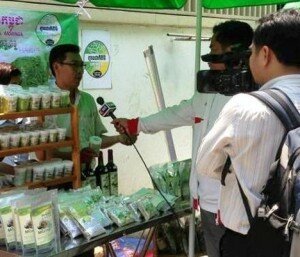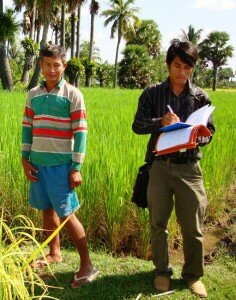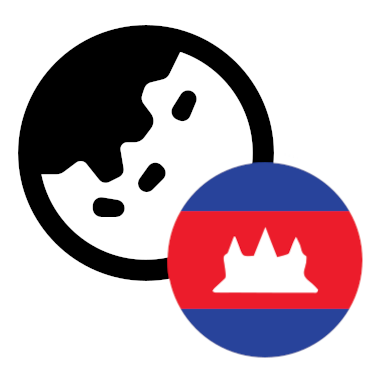
Display of certified organic products during COrAA’s 2nd Organic Fair, March 2014
11 August 2014
Phnom Penh, Cambodia – Issues of food safety and nutrition have become a part of public discussions in many countries. Also in Cambodia, the number of people who are concerned about the quality of food and make an effort to consume safe and healthy foodstuff is continuously increasing. When in search of wholesome food, organic is the best option. However, many people rightfully ask, “How do we know that it is really organic? How can we trust claims that certain rice, fruits or vegetables were produced organically?” Commonly, certification of producers and processors is the means to enable consumers to trust products.
To gain consumer trust in organic products, the Cambodian Organic Agriculture Association (COrAA), with support from GIZ, is developing a certification system for the domestic market. To independently certify processes throughout the value chains for organic, chemical-free or other food production standards has been the founding mission of COrAA since 2006. However, it was only in 2010 that COrAA started to conduct inspections and to develop a certification system. Currently over 30 producers have obtained certification based either on the Standard for Organic Crop Production or the Standards for Chemical-free Crop Production.
On request, COrAA sends an independent inspector to inspect the farm, plantation, or food processing operations. Farmers are inspected individually, or in a group. Smallholders usually

An inspector, accompanied by the owner, checks an organic rice field.
join an organic producer association or a cooperative, which have set-up an Internal Control System to safeguard the integrity of the organic quality of their products.
All persons dealing with the products are identified, registered, instructed on the requirements for organic certification and contracted to ensure compliance. The activities of the persons involved are then monitored in a system of regular visits and documentary control. The inspectors of the group visit every field at least twice during the growing season and record their findings. COrAA’s inspectors check if the group can manage its control system. During the inspection they check different areas of the farms at random.
Farms and processors are inspected once a year, while organic vegetable producers are examined twice a year. However, certification bodies also have to conduct unscheduled inspections to assure that producers follow standards. During the audit, the inspector assesses the producer’s understanding of basic organic farming rules and tests for the possible contamination of organic fields with chemicals from adjacent fields. Then, the inspector will check the fields and all storage facilities, including the farmer’s house. The findings are summarized in the inspection report. Deviations or non-conformities and corrective measures will be pointed out. The COrAA-assigned inspector has to discuss the findings with the farmer or operator.
After this, the inspection report is submitted to the Certification Committee, which is composed of three people independent from COrAA. Based upon the review, the committee will decide if certification can be granted. COrAA can reject an application for certification if the respective standards were not met, or if they were violated.
Certification is expressed to the public by COrAA’s certification marks, also known as labels. These are marks of conformity, not to be confused with trademarks. A mark can only be used on products which come from farms that have been certified based on one of COrAA’s standards.
COrAA strives to further professionalize its certification system by upgrading the skills of the inspectors and the certification managers as well as by further defining the certification processes. In addition to cooperating with regional certification bodies that are members of the Certification Alliance (CertAll), COrAA is also working towards the recognition of its certification system by other ASEAN member countries. In the future, COrAA hopes to offer certification for international markets such as the EU at reasonable costs through CertAll members, which have obtained respective accreditation.
The Certification Alliance includes members from China, India, Nepal as well as several ASEAN countries. The aim is to improve exporting conditions for Cambodian organic products to reach buyers in the region.
COrAA is also preparing the certification for food products obtained through ‘wild collection’, such as honey. Commercial inputs for organic agriculture, such as organic fertilizers, are another area of concern. Furthermore, COrAA currently prepares guidelines for organic inputs to enable the certification of such products.
For more information, please contact Mr. Winfried Scheewe (email: [email protected]).
